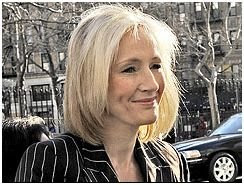Copyright violation is an unfortunate situation which is plaguing our world at the moment. Apparently, some people shamelessly choose to feed off the hard work and ideas of others for monetary or other personal gains. But why is copyright such a big deal?
Baran (2006 p. 470) defines copyright as "identifying and granting ownership of a given piece of expression" which aims to protect an individual's financial interest in their work. In this case, I shall draw upon a rather high profile issue of copyright violation involving the author of Harry Potter, JK Rowling and Steven Vander Ark, owner of the Harry Potter Lexicon website.
Baran (2006 p. 470) defines copyright as "identifying and granting ownership of a given piece of expression" which aims to protect an individual's financial interest in their work. In this case, I shall draw upon a rather high profile issue of copyright violation involving the author of Harry Potter, JK Rowling and Steven Vander Ark, owner of the Harry Potter Lexicon website.
 J.K. Rowling
J.K. Rowling(Source: CBS News 2008)
Dominick (2007) argues that the newest issue in copyright infringement pertains to the internet, as was apparent in the Harry Potter case. It is undoubtedly becoming harder to contain copyright violators online since it is almost impossible to track them all down with thousands of plagiarists roaming freely online. Students are one of them. The Centre for Academic Integrity reported that almost 80% of college students have admitted to plagiarizing at least once (Plagiarism.org 2009). But have they all been caught?
Hence, this creates a certain grey area between 'fair use' and copyright violation. The Centre for Social Media (2009) defines fair use as the conditions under which the use of quotations or information from copyrighted works is allowed without permission or payment. Of course, this is provided that the original source or the owner is credited. Looking back at Rowling vs. Vander Ark, it was essentially the perceived sense of fair use by Vander Ark and his publishers which led to the court case. RDR Books considered it fair use, claiming that the encyclopaedia was a legitimate guide aimed at explaining the very intricate world of Harry Potter (CBS News 2008). So where does one draw the line, seriously?
Baran (2006) for one argues that the internet has presented copyright with a tricky situation and advises a careful reconsideration of laws as tightening copyright ultimately restricts "the flow of art, science, and expression" (Baran 2006, p. 472). Perhaps a certain amount of freedom to experiment and to borrow ideas should exist then, as it could well lead to something new and better altogether. But let it not be at the expense of the original.
References:
Baran, SJ 2006, Introduction to mass communication: media literacy and culture, 4th edn, McGraw Hill, New York.
CBS News 8 September 2008, 'Harry Potter author wins copyright claim', viewed 15 June 2009.
URL: http://www.cbsnews.com/stories/2008/09/08/entertainment/main4426302.shtml
Centre for Social Media 2009, The code of best practices in fair use for media literacy education, viewed 15 June 2009.
URL: http://www.centerforsocialmedia.org/resources/publications/code_for_media_literacy_education/
Dominick, JR 2007, The dynamics of mass communication, 9th edn, McGraw Hill, New York.
Plagiarism.org 2009, Plagiarism in the digital age: voices from the front lines what's happening in college campuses today, viewed 16 June 2009.
URL: http://www.plagiarism.org/
No comments:
Post a Comment